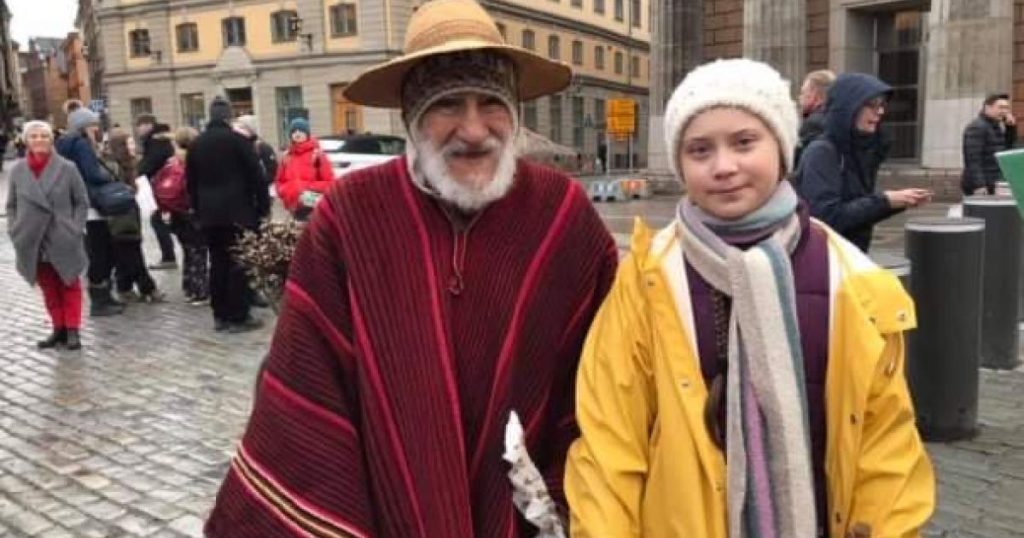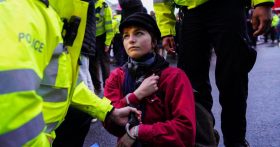Hugo Blanco and ecosocialism
3 min read
Trotsky, a key Marxist theorist during the Russian Revolution and then leader of the Red Army, had been exiled by Stalin from the Soviet Union. He formed the Fourth International as a global revolutionary party. ‘Trotskyists’ were thin on the ground in Latin America, although they have tend to be strongest in Argentina.
Hugo left university and threw himself into political activity, working in factories and organising workers in Argentina and later in Peru. In Peru he organised a demonstration against Richard Nixon and created trade union bodies.
One night he found himself in a police cell in Cusco. With him were three indigenous activists, who persuaded him to help them fight for land rights.
Freed from prison, he joined the indigenous peasants in a region just next to the Amazon. They occupied land but the landowners responded with violence. The indigenous community had no protection from the police, who sided with the landowners. So he helped them organise self-defence militias.
Threats
A full scale uprising took place, which changed Peruvian history, inspiring a degree of land reform in the country.
Hugo was put on trial and imprisoned. He was released in 1970. However, the new government hated his activism in supporting strikes and demonstrations, so captured him once again and put him on a plane to Mexico.
The 1970s therefore saw him in exile, including in Argentina. He narrowly escaped death during the coup against the the socialist president Salvador Allende in Chile. He was rescued by the Swedish Embassy and as a result spent many years in Sweden.
Towards the end of the decade Hugo returned to Peru, ran as a presidential candidate and eventually he became a senator. He hated electoral politics but his interest in the environment deepened when he was in office. He became a lifelong campaigner against pollution and the mining projects that devastated the environment and took land from the people.
He received death threats from the Shining Path and the internal security services in Peru, and found himself once again in excile. During the 1990s he lived in Mexico, where he was increasingly influenced by the Zapatistas. While he maintained contacted with the Trotskyist Fourth International right up until his death this year, his politics became more like the Zapatistas during this period.
Destruction
Hugo was also hugely inspired by the struggle of the Kurdish people in Rojava. The Zapatistas and the Kurds with their allies in Rojava promote a feminist confederal democratic politics – with more in common with the green anarchist thinker Murray Bookchin than Trotsky.
He published Lucha Indigena, which means literally ‘Indigenous fight’. He argued that capitalism was a ‘mode of destruction’ and viewed both workers and peasants as being at the forefront of struggles to protect the Earth.
Towards the end of his life Hugo became increasingly concerned about climate change. He became a prominent advocate of an ecosocialist approach, arguing that capitalism by promoting every increasing economic growth tends to wreck the planet.
He saw how the environment was being devastated in Latin America, he also noted that to end climate change we need to stop extracting coal and oil. For him indigenous movements opposing extraction were essential to stopping rising CO2 emissions. He supported the efforts of the Peruvian Amazonian people to defend the rainforests from gas and oil exploration.
Inspiring
Hugo made several speaking tours in Europe, once speaking at a Green Party conference in Birmingham. He also sent his solidarity greetings when workers on the Isle of Wight occupied the Vestas wind turbine factory to stop its closure.
And of course he got to meet and give his support to Greta Thunberg in Stockholm in 2019. His last days this year were spent in Sweden with his family.
Hugo Blanco was an inspiring green revolutionary who struggled for essential change nearly every day. Almost every waking moment was an episode in ecological activist and liberation struggles. He championed a huge variety of causes.
As Che Guevara said, “Hugo Blanco has set an example”. We can learn from him.
This Author
Derek Wall is a former Green Party principal speaker and author of Hugo Blanco: A revolutionary for life, published by Merlin Press and Resistance Books in 2018.





